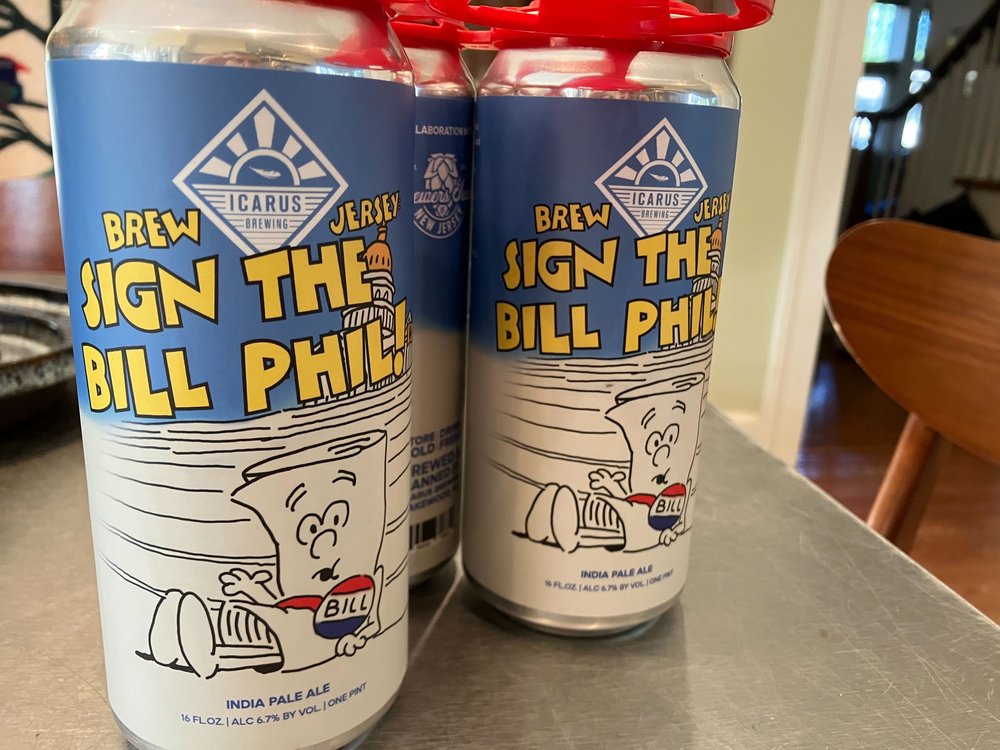Gov. Murphy won't yet lift craft breweries restrictions, even if they're 'ridiculous'
Sept. 14, 2023, 1:13 p.m.
As he sipped a "Sign the Bill Phil" beer, the NJ governor said he needs the political support for his own liquor license reform plan.

New Jersey Gov. Phil Murphy sat at a table Wednesday night behind a microphone and alongside an open can of “Sign the Bill Phil” beer.
The governor took a sip, “just to be social,” at the urging of WNYC “Ask Governor Murphy” host Nancy Solomon. She’d gifted the can from Icarus Brewing in Lakewood to Murphy during the live broadcast.
“It's really good, by the way, guys,” Murphy said. “That is a very nice beer. It is a good beer.”
But the governor doesn’t plan to sign the bill — at least not until he can use it to leverage legislation he wants.
Icarus worked with the Brewers Guild of New Jersey on the beer — a gimmick meant to pressure Murphy to lift restrictions that breweries say threaten to kill their business. The state’s Division of Alcoholic Beverage Control first put the restrictions in place four years ago, and they went into effect as brewers renewed their licenses last year. The rules limit how often breweries can host events on-site or participate in events off-site, and prevent them from partnering with food trucks and other vendors who offer food. They also keep brewers from running pop-up shops, selling coffee or holding happy hours.
And while both houses of the state Legislature unanimously passed a bill to loosen the restrictions earlier this year, Murphy says he’s holding off until he can get lawmakers to take up his own plan for liquor license reform. In the meantime, the state is declining to enforce the restrictions until at least Jan. 1.
Murphy said on “Ask Governor Murphy” that breweries, distilleries and wineries are operating under “ridiculous restrictions” — “but I'm not going to get piecemealed on this.”
The governor has struggled to get widespread support for his proposal to lift Prohibition-era state caps on how many liquor licenses can be issued in a given municipality — currently limited to one for every 3,000 residents.
Murphy would gradually loosen the population cap and eventually eliminate it altogether. After that point, business-to-business liquor license sales would be banned. In a few New Jersey towns with high demand, such licenses can go for upwards of $1 million. Under Murphy's plan, existing liquor license holders would be compensated for their investments, though it’s not yet clear how any compensation would be calculated.
The governor argues expanding liquor licenses would generate up to $10 billion in economic activity over a decade. Industry groups argue it would hurt family-owned bars that both depend on the market value of their licenses for an economic cushion, and that invested in those licenses knowing their local competition would be limited.
Murphy said he expects legislative leaders to hammer out a version of his proposal after the November election, when all seats in the state Legislature go before voters.
A caller to the show, Al from Clark, questioned that plan — giving the Legislature limited time in a lame-duck session when a bill the governor also says he supports is sitting on his desk.
“A lot of these businesses are sort of holding their breath in the next three months that, you know, they don't want to be going to a bank and saying ‘we need a loan to expand’ and can't get it because we don't know what's going to happen here,” Al said.
Murphy acknowledged he’s using the popular measure to lift brewery restrictions in order to get a discussion going about his own more controversial plan.
“You've got a lot of folks, as you [Al] rightfully put it, unanimously agreeing for a slice of this. The rest of it is harder and probably not unanimous. But if we want to unleash Main Street in this state, and I certainly do, and I think I'm joined by God-willing enough legislators who see it in a similar light, that’s what we’re going to do,” he said.
NJ Gov. Murphy hints at financial lifeline, 'public good operator' as bus companies falter Murphy would bar resale of NJ's lucrative liquor licenses — but punts on how to reimburse owners